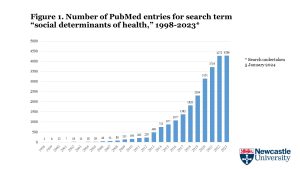IN A NUTSHELL Editor's noteInsightful reflections here by professor Theodore Schrecker, whereby new arguments add to perception, as highlighted in a two-part blog recently published on PEAH, that Covid-19 pandemic just represented a tipping point into a new normal of even greater inequality, with predictably negative effects on health

Emeritus Professor of Global Health Policy at Population Health Sciences Institute, Newcastle University
The Pandemic as Tipping Point, Revisited
The headline of a May, 2023 New York Times story about the fate of the United States policy response to the Covid-19 pandemic read: “The U.S. Built a European-Style Welfare State. It’s Largely Over.” The headline succinctly captures the speed with which economic and social policy has returned to business as usual, even more quickly than was the case after the 2007-2008 financial crisis. What once seemed promising opportunities to “build back better” – rhetoric that was adopted by the Biden White House, among others – have now been abandoned, with the partial exception of some countries’ green industrial policies. Even these appear largely confined to writing large cheques to transnational corporations.
In spring of 2023, I wrote a two-part post in which I predicted that the pandemic was likely to represent a tipping point into a new normal of even greater inequality, with predictably negative effects on health. The tipping point concept is most familiar from the science of global environmental change, but has broader applicability. On one definition, “a tipping point is a threshold at which small quantitative changes in the system trigger a non-linear change process that is driven by system-internal feedback mechanisms and inevitably leads to a qualitatively different state of the system, which is often irreversible.” An academic version of the argument in my spring post, with updated and more extensive documentation, has now been published in Health and Human Rights Journal, as part of a special section on inequality and the human right to health.
In the article, I focus on three aspects of the post-pandemic world. The first is the extreme concentration of wealth at the top of national and global economic distributions, and the corollary influence of the ultra-wealthy. Well before the pandemic Brooke Harrington, a sociologist who trained as a financial adviser to the one percent as part of her research, warned that “many countries are already more receptive and accessible to wealth managers, who are acting on behalf of the world’s richest people, than they are to elected representatives from their own governments …. [T]he high-net-worth individuals of the world are largely ungoverned, and ungovernable.” The pandemic has only magnified their influence, by making them even richer.
The second is the accumulation of wealth across a broader stratum of the population, leading to what one important recent article describes as “a much wider middle-class politics of asset appreciation – a politics that has come to centre on housing in particular” and has its origins in the financialization of housing after the 2007-2008 crisis. Above and beyond short-term effects on political allegiances, this will have knock-on effects on inequality as, for example, the US$6 trillion added to the housing wealth of US households during the pandemic is transferred intergenerationally. For those not benefiting from growing housing wealth, a crisis of housing affordability that was already evident in much of the world pre-pandemic threatens to last for a generation, in many cases compounding insecurities related to employment.
A third element is the persistence of neoliberal or market fundamentalist ideology, which acts as a straitjacket on economic and social policy by limiting what is thinkable in the policy universe. Thus, even parties on the electoral left are largely silent on the topic of improving the progressivity of taxation, and many have conspicuously rejected any form of wealth tax, even though economists including the 2023 winner of the American Economic Association’s John Bates Clark medal have convincingly refuted claims that such a tax would be difficult to implement. An intriguing and promising exception to neoliberal hegemony on tax matters is the global minimum corporate tax agreement in which more than 130 countries have sought to reduce corporate tax avoidance. Implementation is scheduled to begin in 2024, but as the Economist drily noted, “the fanfare” when it was announced “underplayed quite how much of the nitty-gritty was still to be worked out”. The agreement’s effectiveness hinges on consistent national implementation, which is hard to envision in the context of (for example) a probable second Trump presidency. Meanwhile, roadblocks to more progressive taxation of other kinds probably mean the end of viable tax-funded universal health coverage in countries like Canada and the United Kingdom, where underfunded care provision is in a state of deepening crisis doggedly ignored by the political class.
It is now more than 15 years since the WHO’s Commission on Social Determinants of Health began its landmark report by observing that “unequal distribution of health-damaging experiences is not in any sense a ‘natural’ phenomenon but is the result of a toxic combination of poor social policies and programmes, unfair economic arrangements, and bad politics.” Reference to social determinants of health in the research literature has blossomed (Figure 1), but the bad politics seem if anything more entrenched than ever. Few political actors share the clarity and commitment of Boston’s Ayanna Pressley in the 2018 election campaign that took her to the US House of Representatives:
“Today, when you board the [Massachusetts Bay Transportation Authority’s] number 1 bus in Cambridge, it’s less than three miles to Dudley Station in Roxbury, but by the time you’ve made the 30-minute trip, the median household income in the neighbourhoods around you have dropped by nearly $50,000 a year. As the bus rolls through Back Bay, the average person around you might expect to live until he or she is 92 years old, but when it arrives in Roxbury, the average life expectancy has fallen by as much as 30 years. …. These types of disparities exist across the 7th District, and they are not naturally occurring; they are the legacy of decades of policies that have hardened systemic racism, increased income inequality, and advantaged the affluent.”
What to do about those policies is the challenge, made more formidable than ever by various ways in which the pandemic ratcheted up economic inequality and made yet more resources available to the wealthy promoters of “zombie neoliberalism.”
Author’s note: Some of the hyperlinks in this post may be paywalled. If you encounter difficulty accessing sources, contact me (tschrecker@gmail.com) and I will try to send them on.
—
BY THE SAME AUTHOR ON PEAH The Covid-19 Pandemic as Tipping Point (Part 2) The Covid-19 Pandemic as Tipping Point (Part 1) Globalization and Health: Looking Backward, Looking Forward New Year, New Lockdown in the United Kingdom: ‘The Great Deception’ No Exit? The United Kingdom’s Probable Russian Future Whistling Past the Graveyard of Dreams: Hard Truths About the Likely Post-Pandemic World Plague and Depression in the Just-In-Time World Why No Talk of an Inequality Emergency? Revelation! The International Monetary Fund Discovers Tax Avoidance and Capital Flight ‘Lifestyle Drift’, Air Pollution and the World Health Organization Public Finance and Public Health What Public Health Policy Can Learn from the Murders of Nicole Brown Simpson and Ron Goldman On Health Inequalities, Davos, and Deadly Neoliberalism Environment and Health in the Anthropocene Brexit can be Hazardous to our Health ‘Neoliberal Epidemics’ in Global Context
